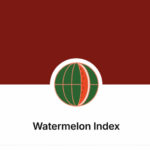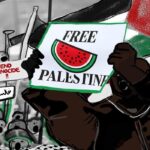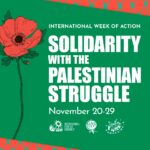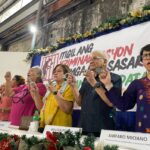Last week, Focus on the Global South co-organized with the Chulalongkorn University Social Research Institute and Project SEVANA a climate justice discussion, which gathered activists, scholars, researchers, and long-time allies in the Thai civil society and climate and environmental justice movements. The conversation centered around the outcomes of the recently concluded 28th Conference of the Parties (COP28) of the United Nations Framework Convention on Climate Change (UNFCCC) in Dubai, United Arab Emirates, and implications and opportunities for peoples’ movements in Thailand and the Global South.
Dorothy “Dottie” Guerrero, Head of Policy and Advocacy of the United Kingdom-based democratic social justice organization, Global Justice Now and who has been following the international climate negotiations over the years was the main speaker. Dottie shared her inputs and analysis on the conflicts, contradictions as well as opportunities and ideas on ways forward from COP28.
In the open discussion, participants collectively reflected on several critical questions (among many others we have in the climate and environmental justice movements) as we reach close to three decades of international climate negotiations: How do we push for fossil fuel phaseout (as opposed to just “transitioning away”)? How do we argue for just transitions—especially when governments say there is no money for it? What do we do with corporations and with the social component and business model that are most of the time on the opposing position? How do we go about the shift from multilateralism to multistakeholderism and the corporate capture of global decision-making including in spaces such as COP? Where are the sites of engagement and opportunities in our own contexts and lived realities in the global South – and what about from the point of view of transnationalism?
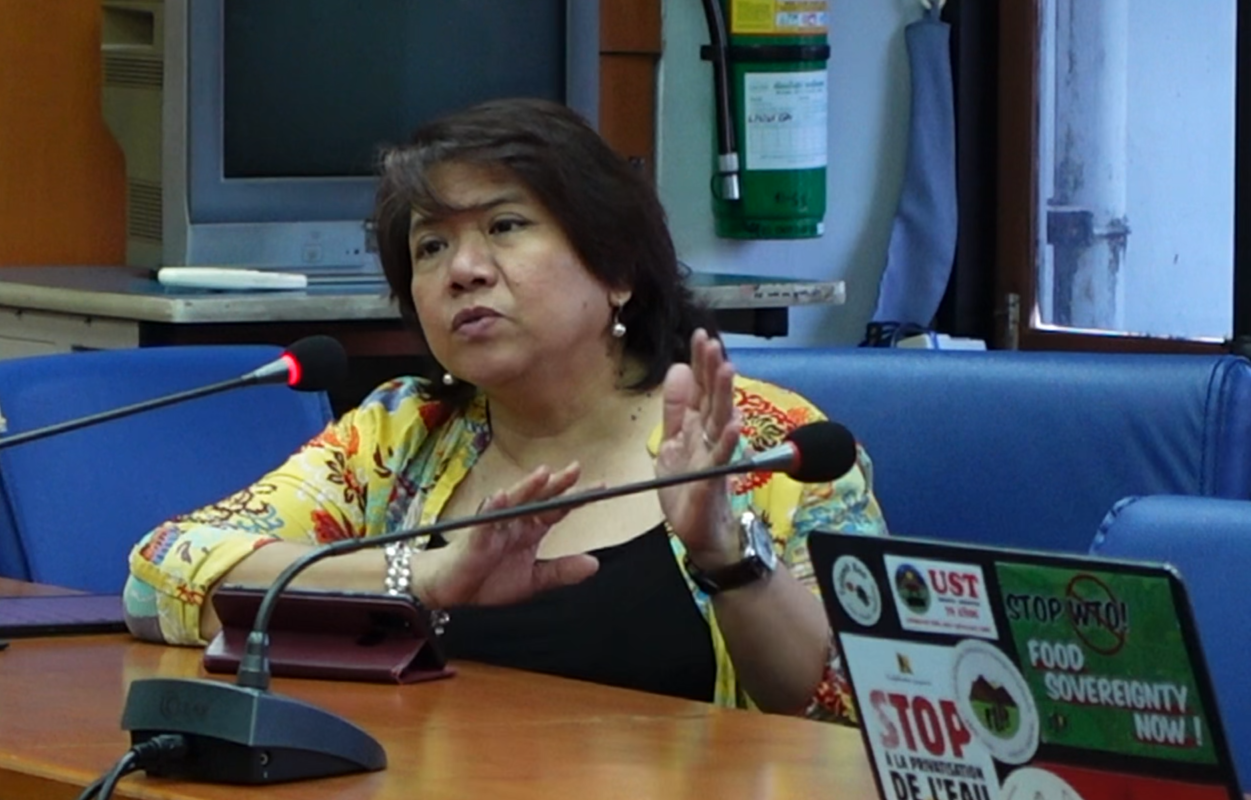
Dorothy “Dottie” Guerrero speaking at a public discussion at Chulalongkorn University, Bangkok. January 2024. Photo by: Kumphon Yalai, Project SEVANA.
Reviewing the outcomes
According to Dottie, the COP in Dubai was one of the most controversial ones given the fact that the President of the COP28, Sultan Ahmed Al Jaber, holds the environment portfolio but at the same time is also the CEO of the Abu Dhabi National Oil Company and the Emirati state-owned renewable energy company, Masdar. This complex situation of having individuals wearing two hats, as government officials in key positions and as heads of state-owned enterprises, underscores the interplay between corporate and state power and its contradictions, and how multilateral spaces like COP are being used to push oil and energy deals. The COP28 was attended by 2,756 corporate lobbyists (almost five times more than the 636 in the previous edition), including from big agribusinesses, transnational corporations, and the five oil majors: BP, Shell, Chevron, ExxonMobil and TotalEnergies.
Dottie also talked about the COP27 in Sharm El Sheikh, Egypt in 2022, when the issue of Loss and Damage (L&D) Fund was discussed but ultimately ended up with questionable results: a paltry US$700 million or so pledges (not actual legally binding commitments) vis-à-vis the actual commensurate amount needed (US$250 billion) based on studies. The hypocrisy of historic big emitters like the US—putting only US$70 million to the L&D Fund—as governments and state-owned companies continue to invest trillions of dollars in fossil fuels until 2050, was also highlighted. Concerns were also raised on the governance of international financial institutions like the World Bank, who will administer the L&D Fund as its “interim” host: the way they do things as loan pushers, their inability to do grants, and their propensity to remain as “forever” hosts of such funds despite vocal opposition from the global South.
Moreover, beyond the L&D Fund is the critical question of climate restitution and reparations and righting the historical injustices: by addressing inequalities, redressing harm, and decolonizing the climate discourse. This also means countering the “superiority” of Eurocentric narratives and dominance of Western thinking that exclude and marginalize grassroots and Indigenous peoples’ knowledge, perspectives, visions, systems, and practices.
Ultimately, the UAE consensus is what the oil companies wanted, and similarly, what countries such as the US, UK, and member states of the European Union wanted, too, despite posing themselves as “supporters” of fossil fuel phaseout. The hypocrisy of these countries presenting themselves as “champions of fossil fuel phase-out” while not putting any concrete means of implementation that includes sharing necessary technology and giving more for climate finance (that is more public and non-debt creating as opposed to private sector-led and through loans) and at the same time, continuing with their long-term oil investment and licensing plans till 2050 became more evident.
Dottie also underscored the issues around just transition and the interstate conflicts wherein the different states would have a different agenda when it comes to transitioning away from fossil fuels to renewable energy—with questions on who should do the phaseout first, who should fund it, and who has and controls the technology. The agenda of toning down the principle of Common But Differentiated Responsibilities and Respective Capabilities (CBDR-RC) and trying to do away with the principle and question of equity and international cooperation was also observed in COP28—as if the Kyoto Protocol that set binding emission reduction targets and COP21 in Paris never happened.
There were debates on the focus of the transition: Will it just be an energy transition? How will other components such as labor, land use, ownership of assets, and others be considered? At the same time, the inter-class conflicts in all of these were also highlighted: the big difference between the top 10% of the population that uses more energy and majority of the population who are suffering from energy poverty; the question of renewable energy transition and the drive for the further extraction of “critical” minerals (critical for whom?)—notwithstanding the issues about where these minerals are mostly found (in ancestral domains, in different communities in the global South,) and how their extraction is multiplying the hardships of communities.
On the Global Stocktake, one of the touted achievements of the COP28, the spirit and content of the text indeed acknowledges the shortcomings—that many of the Nationally Determined Contributions (NDCs) will not amount to meeting the 1.5°C goal—the so-called “North Star” of the agenda. However, the global climate negotiations have been continually clouded with distractions and false solutions (e.g. carbon markets, techno-fixes, geoengineering, nature-based solutions), with a bleak outlook that requirements on climate finance will not be met. There remain the challenges of making polluters pay, overhauling the system of production, and planning the economy both at the national and international levels—to a level that one can actually talk about critical timelines on just transition and what kind of society we collectively want to have and what energy systems will the foundation of our economies be.
The issue of climate and its intersections with other issues such as agriculture, trade, finance, geopolitics and geoeconomics, wars and conflicts, among others was also discussed. In the COP28 that took place in the context of ongoing Russian invasion of Ukraine and Israel’s occupation and genocidal war in Gaza, the question of Palestine and broader peace and security issues were put right in the center by the Peoples’ Assembly.
Strengthening solidarities and people power
In her piece, Conflicts, Contradictions and Chances from the Dubai COP28 Consensus Dottie argued that the outcome of the COP28 is “obviously far weaker than hoped for, but this is not surprising and at least improves the terrain of struggle in the future.” She concluded by concretely putting forward the necessity of “grow[ing] our movement faster and stronger to make a Fossil Fuel Non-Proliferation Treaty a reality.” The initiative is a global network of progressive parliamentarians, labor movements, and civil society organizations campaigning for an end to fossil fuels towards clean energy and low-carbon solutions that are swift, equitable, funded, and feminist. Originally started by the Small Island Developing States, the treaty has now gained widespread support from civil society movements and states alike, and during the COP28, Colombia became the biggest economy to join the treaty.
As capitalists want to extract more profits in the era of climate breakdown, countries in the global South are pushed to continue borrowing money to develop and invest in “alternative” technologies (such as hydrogen), and not in renewable energies like solar and wind. This clearly shows the asymmetry of power between corporations and governments.
Given this, there are different questions on what would be effective strategies in building people power and dismantling (even taming corporate power): How can we push governments to do what we want? How can we increase our own power? Dottie opined, “Civil society now compared to these powers is weak, so we need to organize more, we need to work harder, increase our power, towards a society wherein you can change the balance of power.”
Filling the streets with people is still important because the issues that get on the table are the things we push in the streets: loss and damage, just transitions, fossil fuel phaseout, among others. But, there is a big difference between mobilizing and organizing; of ensuring that when we mobilize people that they are also organized. Finally, we need to see what can be effective, doing actions based on our circumstances, contexts, and particularities, but at the same time, making these actions strategic as we talk about shifting the balance of power.
Looking ahead
The next COPs will take place in the largest city in the Caucasus region, Baku (COP29) and the Metropolis of Amazon, Belém (COP30)—and many groups would say that there will be more spaces for meaningful engagement and mobilization in COP30 in Brazil considering the challenges of organizing civil society and peoples’ assemblies in Azerbaijan. Dottie argued, “The thing is, COP is still your political arena on climate and there will still be global climate mobilizations in Baku, there will be another COP29 Coalition, [following] the model of organizing civil society that started in [COP26] Glasgow—with local host NGOs and climate justice networks and movements organizing together with global climate activists.”
Indeed, the climate discussions and actions do not end and start in a COP, as it should be an all-year mobilizing and campaigning activity. Civil society organizations and peoples’ movements should be able to influence the positions of the negotiators before they reach the negotiating table. This is not to ignore the differences in national contexts and possibilities in each country but more so about recognizing the imperative of starting from one’s community and identifying ways to be more creative and innovative in our actions. “You cannot push what is on the table without pushing it on the streets, on discussions like this, and also on educating our negotiators and representatives,” added Dottie.
It is also important not to compartmentalize our thinking—that when we think and talk about the climate, there is no such thing as “the climate and the labor movement and the migrant issues, etc.”—as if these struggles are separated from one another. There is the significant component of bridging and linking these interconnected issues, as we collectively reflect on and better understand our historical and ongoing struggles: celebrating the gains and victories, and building on them as we continue struggling for a more just, sustainable, and peaceful world
To watch Dottie’s 24-minute presentation, please go to this link: https://www.youtube.com/watch?v=R-rkg9nVYFY\

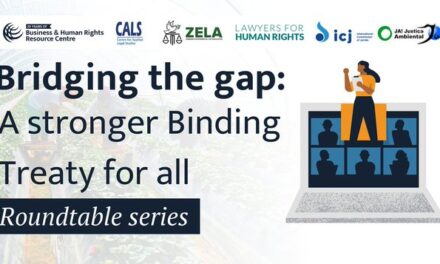

![[CSIPM] Women and Gender Diversities Working Group Statement on CFS Gender Equality and Women’s and Girls’ Empowerment](https://focusweb.org/wp-content/uploads/2022/10/Schermata-2021-02-22-alle-15.29.09-440x264.webp)

